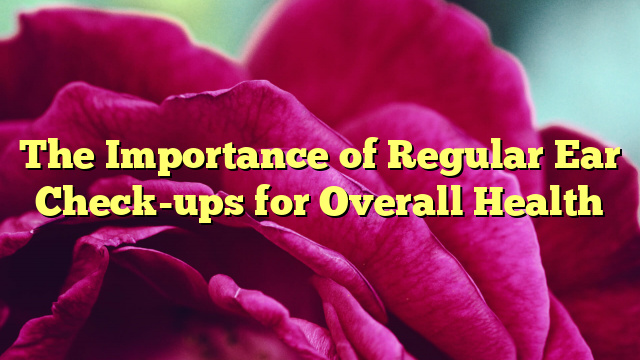Regular ear check-ups are an essential part of maintaining overall health. Many people overlook the importance of taking care of their ears, but neglecting this aspect of health can lead to numerous problems. In this article, we will explore why regular ear check-ups are crucial and how they can benefit your overall well-being.
Prevention of Hearing Loss
One of the primary reasons for regular ear check-ups is the prevention of hearing loss. By having your ears checked regularly, you can catch any issues early on and take steps to prevent further damage. Hearing loss can have a significant impact on your quality of life, so it is essential to monitor your ear health to maintain good hearing.
Early Detection of Ear Infections
Ear infections are common, especially in children, but they can occur in people of all ages. Regular ear check-ups can help in the early detection of these infections, allowing for prompt treatment to prevent more significant complications. Untreated ear infections can lead to hearing loss, so it is crucial to address them as soon as they are identified.
Improvement of Overall Health
Regular ear check-ups can contribute to your overall health by identifying underlying health conditions that may manifest in your ears. Issues such as high blood pressure, diabetes, and thyroid problems can sometimes be detected through an ear examination. By staying on top of your ear health, you can also monitor your general well-being.
Prevention of Balance Issues
Our ears play a crucial role in our balance, so any problems with them can lead to issues such as vertigo and dizziness. Regular ear check-ups can help in the early detection of balance-related problems and prevent them from worsening. By maintaining good ear health, you can enjoy a better quality of life without the fear of balance issues impacting your daily activities.
Conclusion
Overall, regular ear check-ups are vital for maintaining good health and well-being. By monitoring your ear health, you can prevent hearing loss, detect ear infections early, improve your general health, and prevent balance issues. Make sure to schedule regular appointments with your healthcare provider to ensure that your ears are in optimal condition.
FAQs
1. How often should I have my ears checked?
It is recommended to have your ears checked at least once a year, but more frequent check-ups may be necessary if you have a history of ear problems or if you are experiencing symptoms such as hearing loss or ear pain.
2. Are ear check-ups covered by insurance?
Many healthcare providers cover ear check-ups as part of routine preventive care. Check with your insurance provider to see if these services are included in your plan.
3. What should I expect during an ear check-up?
During an ear check-up, your healthcare provider will examine your ears using an otoscope to look for any abnormalities. They may also conduct a hearing test to assess your auditory function.
Unlock the Secret to a Peaceful Life




